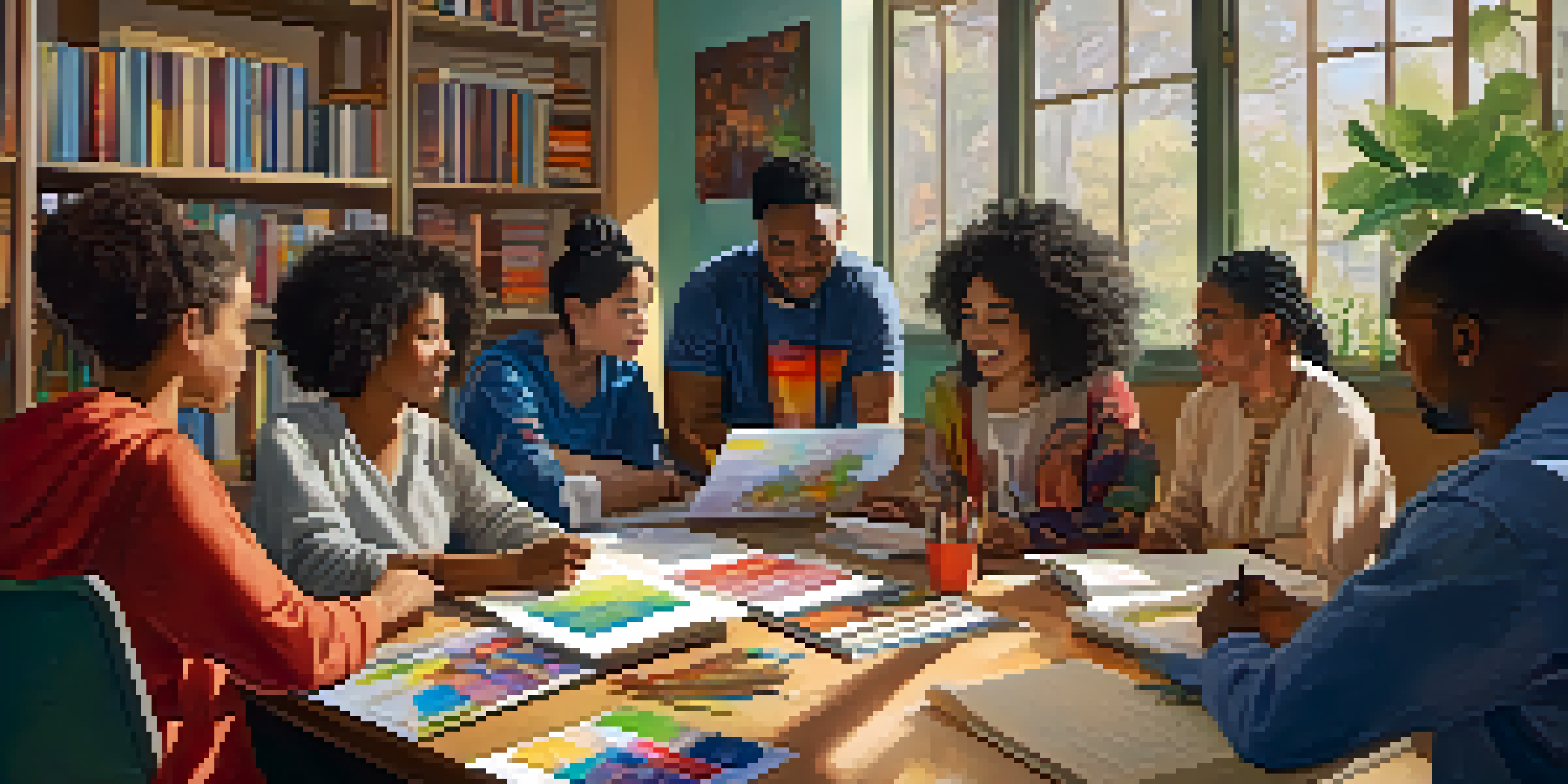The Importance of Cultural Competence in Adult Learning

Defining Cultural Competence in Adult Learning
Cultural competence refers to the ability to understand, communicate with, and effectively interact with people across cultures. In the context of adult learning, this means recognizing the diverse backgrounds and experiences that learners bring to the table. It's not just about being aware of different cultures; it’s about actively engaging with and valuing those differences in educational settings.
Cultural competence is not a destination but a journey that involves continuous self-reflection and growth.
This understanding is crucial as adult learners often come with a wealth of life experience that shapes their learning styles and perspectives. For instance, a learner from a collectivist culture may prioritize group work and collaboration, while someone from an individualistic culture might thrive in independent tasks. Acknowledging these differences can enhance the learning experience for everyone involved.
Ultimately, cultural competence fosters an inclusive atmosphere where all learners feel respected and valued. By embracing this concept, educators can create more effective and engaging adult learning environments that cater to a diverse audience.
Why Cultural Competence Matters in Education
Cultural competence is essential in education because it directly impacts learner engagement and retention. When learners feel that their cultural backgrounds are recognized and respected, they are more likely to participate actively and invest in their learning. This sense of belonging can lead to improved outcomes, as students are more willing to share their thoughts and experiences.

Moreover, in today’s globalized world, adult learners often come from various cultural and ethnic backgrounds. Understanding these differences helps prevent misunderstandings and conflicts that could arise in the classroom. For example, in a diverse group, a joke or comment that seems harmless to one person may be offensive to another. Cultural competence allows educators to navigate these nuances effectively.
Cultural Competence Enhances Learning
Cultural competence fosters an inclusive learning environment where diverse backgrounds are respected and valued, leading to improved engagement and outcomes for adult learners.
Incorporating cultural competence into adult learning not only enhances individual experiences but also promotes social cohesion. By teaching learners to appreciate and respect diversity, we prepare them for a world that increasingly values collaboration and understanding among different cultures.
Key Skills for Developing Cultural Competence
Developing cultural competence involves a set of key skills that educators and learners alike can cultivate. First and foremost, active listening is crucial. It allows individuals to truly hear and understand the perspectives and experiences of others, which is foundational to respectful dialogue and learning.
Diversity is not about how we differ. Diversity is about embracing one another's uniqueness.
Another important skill is empathy, the ability to put oneself in someone else’s shoes and appreciate their feelings and viewpoints. This fosters a deeper connection among learners and encourages a supportive learning environment. For instance, if a learner shares a personal story that highlights cultural challenges, empathizing can help others understand their journey better.
Lastly, adaptability is vital. Adults often have varying learning styles and preferences. Being open to adjusting teaching methods to suit diverse needs not only shows respect for individual learners but also enhances the overall effectiveness of the educational experience.
Strategies for Fostering Cultural Competence
There are several effective strategies that educators can employ to foster cultural competence in adult learning settings. One such strategy is incorporating diverse materials and resources into the curriculum. This can include case studies, literature, and examples from different cultures that resonate with a wide range of learners.
Another strategy is to encourage collaborative learning. Group activities that require learners to work together can help build trust and understanding among peers from different backgrounds. For example, assigning projects that require input from all group members can lead to richer discussions and shared insights.
Key Skills for Cultural Understanding
Active listening, empathy, and adaptability are essential skills for educators and learners to cultivate cultural competence and promote respectful dialogue in diverse classrooms.
Lastly, offering training and professional development focused on cultural competence can empower educators. Workshops and seminars can provide practical tools and frameworks that help teachers integrate cultural awareness into their teaching practices effectively.
Challenges in Achieving Cultural Competence
Despite its importance, achieving cultural competence in adult education can come with challenges. One significant hurdle is the potential for unconscious biases. Everyone carries biases shaped by their experiences, and these can impact interactions and decisions in the learning environment. Recognizing and addressing these biases is crucial for fostering an inclusive atmosphere.
Another challenge is the varying levels of awareness and understanding of cultural issues among learners. Some may have extensive knowledge and experience, while others may feel overwhelmed or unsure about how to engage with different cultures. Educators need to create a safe space where learners can ask questions and express concerns without fear of judgment.
Finally, time constraints can hinder the integration of cultural competence into educational programs. With busy schedules and curriculum demands, educators may struggle to find the time to address these important topics. However, prioritizing cultural competence can ultimately lead to more effective teaching and enriched learning experiences.
The Impact of Cultural Competence on Learning Outcomes
Cultural competence significantly impacts learning outcomes in adult education. Studies have shown that when learners feel understood and respected, they exhibit increased motivation and engagement. This heightened interest can lead to better retention of information and improved academic performance.
Moreover, culturally competent education promotes critical thinking skills. By exposing learners to diverse perspectives and encouraging them to consider different viewpoints, educators help develop adaptable thinkers who can navigate complex situations in their personal and professional lives.
Challenges in Cultural Competence
Unconscious biases, varying levels of cultural awareness, and time constraints pose significant challenges to achieving cultural competence in adult education.
Ultimately, the long-term benefits of cultural competence extend beyond the classroom. Learners equipped with these skills are better prepared to work in diverse teams, communicate effectively, and contribute to a more inclusive society, making cultural competence an essential component of adult education.
Conclusion: Embracing Cultural Competence in Learning
In summary, cultural competence is not just a buzzword; it’s a vital aspect of adult learning that promotes understanding, respect, and collaboration. As adult educators, embracing cultural competence opens up a world of opportunities for learners and enriches the educational experience.
By defining cultural competence, recognizing its importance, and implementing effective strategies, we can create inclusive learning environments that benefit everyone. The journey toward cultural competence may have its challenges, but the rewards—both for learners and educators—are well worth the effort.

As we move forward in our educational practices, let’s commit to fostering cultural competence, ensuring that every adult learner feels valued and empowered in their pursuit of knowledge.